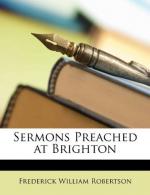appear that there were idle men and idle women, who
went about from house to house, dropping slander as
they went, and yet you could not take up that slander
and detect the falsehood there. You could not
evaporate the truth in the slow process of the crucible,
and then show the residuum of falsehood glittering
and visible. You could not fasten upon any word
or sentence, and say that it was calumny; for in
order to constitute slander it is not necessary that
the word spoken should be false—half truths
are often more calumnious than whole falsehoods.
It is not even necessary that a word should be distinctly
uttered; a dropped lip, an arched eyebrow, a shrugged
shoulder, a significant look, an incredulous expression
of countenance, nay, even an emphatic silence, may
do the work: and when the light and trifling thing
which has done the mischief has fluttered off, the
venom is left behind, to work and rankle, to inflame
hearts, to fever human existence, and to poison human
society at the fountain springs of life. Very
emphatically was it said by one whose whole being
had smarted under such affliction, “Adder’s
poison is under their lips.”
The second license given to the tongue is in the way of persecution: “therewith curse we men which are made after the similitude of God.” “We!”—men who bear the name of Christ—curse our brethren! Christians persecuted Christians. Thus even in St. James’s age that spirit had begun, the monstrous fact of Christian persecution; from that day it has continued, through long centuries, up to the present time. The Church of Christ assumed the office of denunciation, and except in the first council, whose object was not to strain, but to relax the bonds of brotherhood, not a council has met for eighteen centuries which has not guarded each profession of belief by the too customary formula, “If any man maintain otherwise than this, let him be accursed.”
Myriad, countless curses have echoed through those long ages; the Church has forgotten her Master’s spirit and called down fire from heaven. A fearful thought to consider this as the spectacle on which the eye of God has rested. He looks down upon the creatures He has made, and hears everywhere the language of religious imprecations:—and after all, who is proved right by curses?
The Church of Rome hurls her thunders against Protestants of every denomination: the Calvinist scarcely recognises the Arminian as a Christian: he who considers himself as the true Anglican, excludes from the Church of Christ all but the adherents of his own orthodoxy; every minister and congregation has its small circle, beyond which all are heretics: nay even among that sect which is most lax as to the dogmatic forms of truth, we find the Unitarian of the old school denouncing the spiritualism of the new and rising school.
This is the state of things to which we are arrived. Sisters of Charity refuse to permit




